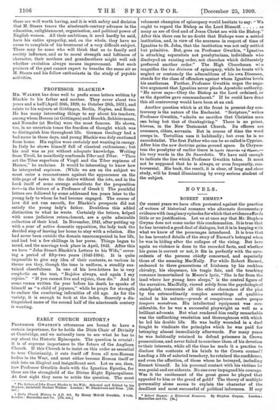PROFESSOR BLACKIE.*
Ma. WALKER has done well to prefix some letters written by Blackie to his father and mother. They cover about two years and a half (April 20th, 1829, to October 28th, 1831), and relate to his sojourn at Gottingen, Berlin, Naples, and Rome. He has many interesting things to say about his teachers, among whom Heeren (at Gottingen) and Boeckh, Schleiermann, and Neander (at Berlin) were the most famous. He shows, too, in no uncertain tones the freedom of thought which was to distinguish him throughout life. German theology had a bad name in those days, and young Blackie was duly cautioned from home. His replies were certainly not wanting in energy. In Italy he shows himself full of classical enthusiasm; but his zeal was as yet without adequate knowledge. Writing from Tivoli, he manifestly confounds Tiber and Mar. "Thou art the Tiber superbum of Virgil and the Tiber supinum of Horace," he exclaims. It would be interesting to know how he interpreted supinum. (While we are on the subject we must enter a remonstrance against the appearance on the title-page of iryfro in the dative without the iota, and in the book itself of some strange substitute for the preposition arrt—in the letters of a Professor of Greek !) The youthful letters are followed by some addressed ten years later to the young lady to whom he had become engaged. The coarse of love did not run smooth, for Blackie's prospects did not satisfy the young lady's father. Doubtless this added distinction to what he wrote. Certainly the letters, helped with some judicious retrenchment, are a quite admirable collection of their kind. In November, 1841, after putting up with a year of active domestic opposition, the lady took the decided step of leaving her home to stay with a relation. She had never been outside the domain unaccompanied in her life, and had but a few shillings in her purse. Things began to mend, and the marriage took place in April, 1842. After this we have " John Stuart Blackie's Letters to his Wife," cover- ing a period of fifty-two years (1843-1894). It is quite impossible to give any idea of their contents, so various in theme are they, though the tone is uniform, a steadily sus- tained cheerfulness. In one of his love-letters he is very emphatic on the text, "Rejoice always, and again • I say rejoice." " If you cannot live and rejoice, then die." And in some verses written the year before his death he speaks of himself as " a child of joyance," while he prays for strength to endure the cumbering infirmities of old age. As for the variety, it is enough to look at the index. Scarcely a dis- tinguished name of the second half of the nineteenth century is wanting.


































 Previous page
Previous page